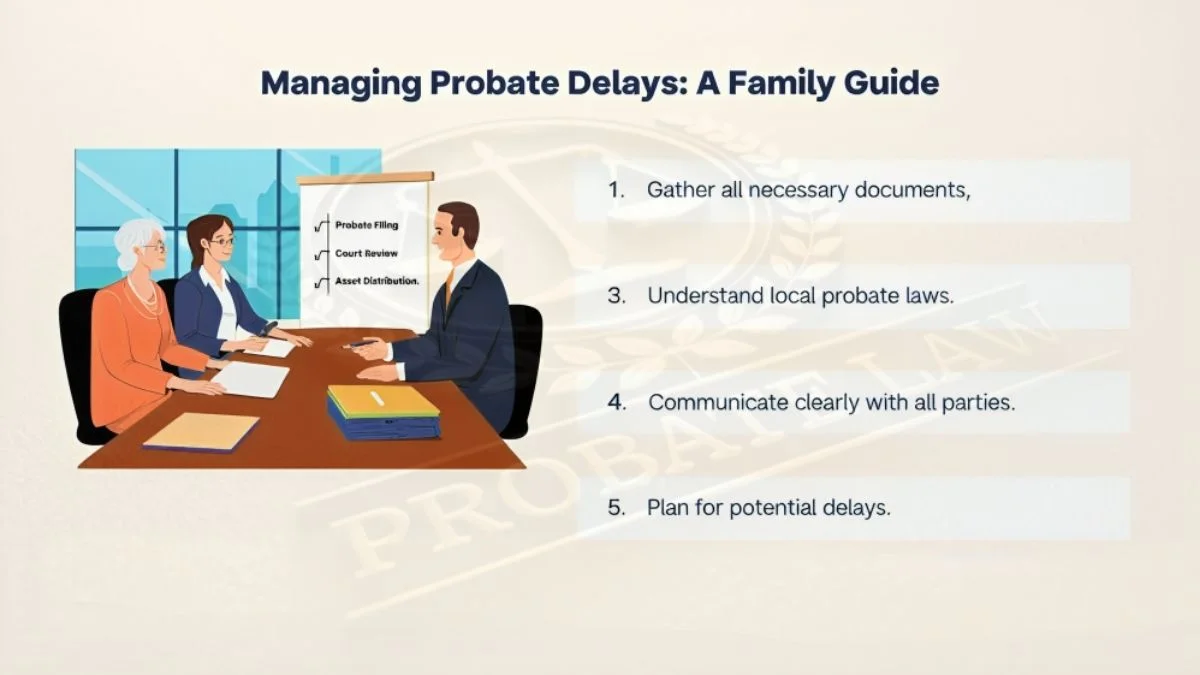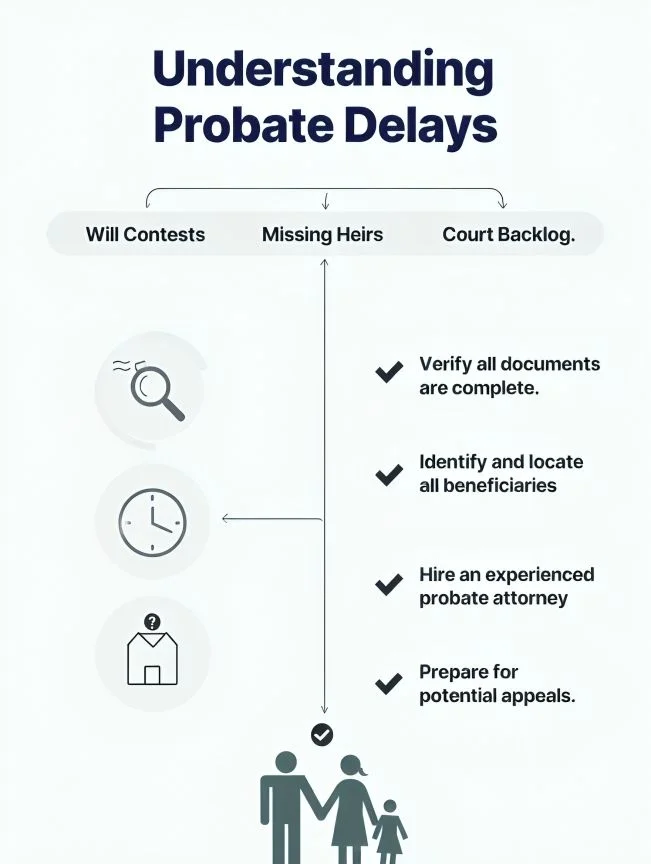Finance
Managing Probate Delays: What Families Should Know

Settling an estate after the loss of a loved one can be an emotionally draining experience. On top of grief, families often face the legal realities of probate a court-supervised process that ensures debts are paid, wills are validated, and remaining assets are distributed correctly. While the system serves an important purpose, it rarely moves as quickly as people hope.
In many cases, the wait for inheritance funds stretches on for months. For families with pressing financial obligations funeral expenses, medical bills, or simply day-to-day living costs this delay can be frustrating. Understanding why probate takes so long, how the process works, and what options exist for those feeling the strain can help reduce stress during an already challenging time.
Table of Contents
Why Probate Takes So Long
Probate timelines vary widely, but several factors contribute to delays. According to the American Bar Association, even relatively simple estates often take at least six months to settle.
Some of the most common causes of slowdowns include:
- Court backlogs: Probate courts handle numerous cases at once, so scheduling hearings and processing paperwork can take time.
- Complex estates: Properties, businesses, and investment accounts often require appraisals or sales before funds can be distributed.
- Disagreements among heirs: Contested wills or unclear instructions frequently lead to lengthy legal battles.
- Creditor claims and taxes: Creditors must be notified and given time to file claims, and tax obligations need to be resolved before distributions occur.

When estates include real estate or business assets, the process can stretch even longer. Selling a home or transferring ownership interests adds extra steps that the court must review and approve.
The Financial Impact on Families
During probate delays, heirs often face significant financial challenges. Expenses tied to the loved one’s passing, like funeral costs or unpaid medical bills, may require immediate attention. Meanwhile, day-to-day living expenses continue, sometimes leaving heirs struggling while they wait for funds tied up in the legal process.
For individuals already juggling financial responsibilities, these delays can feel overwhelming. Some turn to personal savings or short-term loans to bridge the gap. Others begin exploring specialized financial options designed specifically for heirs waiting on probate to conclude.
Early Access to Inheritance Funds
One option that has grown in visibility over the past decade is known as probate advance. These financial arrangements provide heirs with a portion of their expected inheritance upfront, with repayment coming directly from the estate once probate finishes.
The process typically involves:
- Case evaluation: The funding provider reviews probate records to verify the estate’s value and the heir’s expected share.
- Offer: Based on this information, the company proposes an amount the heir can receive right away.
- Agreement: Both parties sign a contract outlining terms and repayment details.
- Funding: Money is delivered quickly, often within days, while the company waits for the estate to pay out after probate closes.
Unlike traditional loans, these arrangements are usually non-recourse. If the estate ends up being worth less than expected, reputable companies absorb that loss rather than demanding repayment from the heir.
Advantages and Trade-Offs
The primary advantage is obvious: immediate access to funds when the legal process moves slowly. Heirs can cover expenses without turning to high-interest credit cards or personal loans.
However, there are trade-offs to consider:
- Reduced final inheritance: Providers charge fees by keeping a portion of the inheritance, so heirs ultimately receive less money than they would by waiting.
- Varied terms: Fees and repayment structures differ widely, making it essential to compare offers carefully.
- Not always necessary: For heirs without pressing financial needs, simply waiting may be the most cost-effective choice.
The Consumer Financial Protection Bureau advises anyone considering financial products to read agreements thoroughly, compare multiple providers, and ensure all terms are clearly understood before signing.
How Technology Is Changing the Process
In the past, inheritance funding often involved lengthy paperwork and slow communication between courts, attorneys, and funding companies. Today, digital platforms have transformed the experience.
Online portals now handle application submissions, document uploads, and contract signing electronically. Some funding providers even integrate directly with probate court databases, speeding up the verification process and reducing administrative delays.
This technology-driven approach has made it easier for heirs to receive funds quickly while ensuring better transparency around fees and timelines.
Practical Steps Before Making a Decision
If you’re considering early access to inheritance funds, taking a few practical steps can help you make an informed choice:
- Talk to the executor: Ask for a realistic estimate of how long probate might take before deciding on early funding.
- Review your finances: Consider whether personal savings, family assistance, or payment arrangements with creditors might be less costly alternatives.
- Compare providers carefully: Fees, timelines, and terms vary, so reviewing multiple offers can help you find the best fit.
- Seek professional advice: Probate attorneys or financial advisors can explain how funding arrangements interact with estate laws and help you avoid costly mistakes.
Resources from the National Consumer Law Center can also help you understand consumer protections related to financial agreements.
Balancing Immediate Needs with Long-Term Planning
Accessing inheritance funds early can provide real relief for families facing financial pressure, but it’s important to weigh short-term needs against long-term impact. Every dollar taken upfront reduces the final inheritance amount, so the decision should align with your overall financial goals.
For some, the ability to pay urgent expenses or avoid high-interest debt outweighs the cost. For others, patience may protect more of the estate’s value in the end.
Final Thoughts
Probate delays are a reality of estate administration. While the process exists to protect fairness and legality, it often moves far slower than families would like.
Options like probate advance give heirs another tool to manage financial stress while waiting for the court system to complete its work. But as with any financial decision, understanding the terms, comparing alternatives, and seeking professional guidance can help ensure the choice supports both immediate needs and future stability.

-

 GENERAL7 months ago
GENERAL7 months agoChristofle – For Those Who Dream of Family Heirloom Silver
-

 SPORTS9 months ago
SPORTS9 months agoDiscover the World of Football with Streameast: Watch Your Favorite Leagues and Tournaments
-

 GENERAL3 weeks ago
GENERAL3 weeks agoUncovering the World of кинокрадко: The Dark Side of Film Piracy
-

 GENERAL3 months ago
GENERAL3 months agoATFBooru: Anime, Gaming, and Subculture Imageboard






















